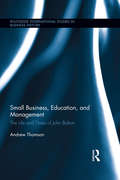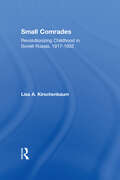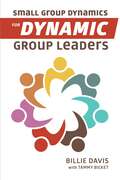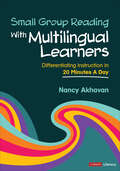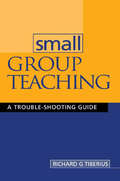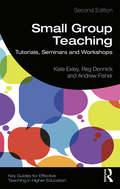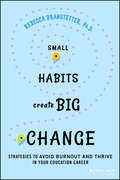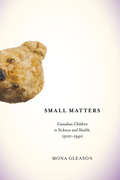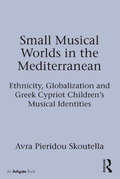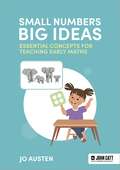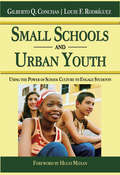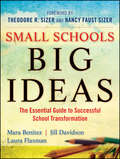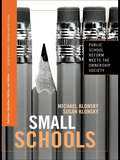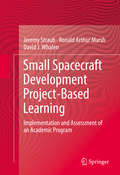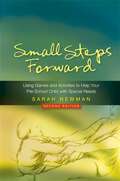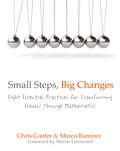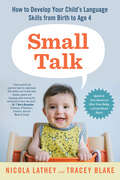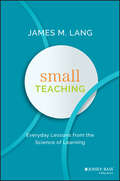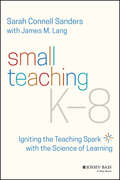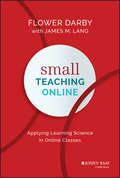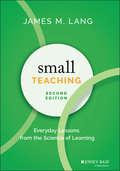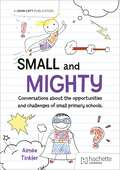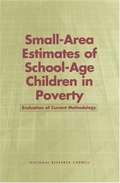- Table View
- List View
Small Business, Education, and Management: The Life and Times of John Bolton (Routledge International Studies in Business History)
by Andrew ThomsonThis book examines the life and times of John Bolton, a Cambridge graduate who graduated as a Baker Scholar from Harvard Business School, and returned to Britain to quickly chair Solartron, one of the outstanding of the early British electronics companies in the 1950s. John Bolton also enjoyed a career of public service and private good works. He led the founding of the Foundation for Management Education, which had an extremely influential role in the development of management education in Britain, and chaired the 1968-71 Committee of Inquiry on Small Firms, resulting in what is now generally called the Bolton Report. The Bolton Report became and continues to be the starting point for analysis of the sector at a time when small business is again being seen as a major contributor to the British economy and has revolutionized attitudes and policy towards the small business sector at all levels. Bolton’s career covered a range of different dimensions of mid to late twentieth century industrial and public life in Britain, and the history is as much about these as it is of the man himself. The intention of this book is to illuminate the institutions in which Bolton worked as well as to paint a picture of his own role.
Small Comrades: Revolutionizing Childhood in Soviet Russia, 1917-1932
by Lisa A. KirschenbaumSmall Comrades is a fascinating examination of Soviet conceptions of childhood and the resulting policies directed toward children. Working on the assumption that cultural representations and self-representations are not entirely separable, this book probes how the Soviet regime's representations structured teachers' observations of their pupils and often adults' recollections of their childhood. The book draws on work that has been done on Soviet schooling, and focuses specifically on the development of curricula and institutions, but it also examines the wider context of the relationship between the family and the state, and to the Bolshevik vision of the "children of October"
Small Group Dynamics for Dynamic Group Leaders
by Billie DavisMost work in the field of Christian leadership has focused on the leader and techniques of management and control. Effective Christian leadership begins with the focus on people and God's purpose for them. With the model of Jesus and His disciples as her starting point, Billie Davis has provided a tool for developing a small group ministry in which members’ strengths and gifts are used to help one another in the biblical sense of Body. Applying an age-level and intercultural approach, Davis examines the structure of groups, how the group influences learning and spiritual development, and the roles people take within groups. Each chapter has self-directed learning exercises and a bibliography of current resources to enhance the reader’s experience.
Small Group Reading With Multilingual Learners: Differentiating Instruction in 20 Minutes a Day (Corwin Literacy)
by Nancy AkhavanWatch multilingual students excel with high-engagement reading lessons Students acquiring English tend to bust every stereotype. The truth is, these learners come to school with linguistic assets, not deficits. They will excel with lively, just-right challenge lessons, and they thrive with opportunities to collaborate with peers. In this authoritative resource, bestselling author Nancy Akhavan shows teachers how to support students at the small-group table in acquiring English as well as developing as readers—simultaneously. Ready-to-go tools include: Essential background on the five stages of language acquisition How-tos for differentiating instruction based on students’ levels of language proficiency as well as their reading proficiency Lesson sequences integrating oral language, phonics, spelling, vocabulary, word work, comprehension, and writing about reading Routines that augment talk about texts so multilingual learners can verbalize their knowledge and articulate thinking A companion website and multimodal scaffolds to support students across reading, writing, speaking, and listening When we gather at the reading table, we have just twenty minutes—we need to make it count. Now we can.
Small Group Reading With Multilingual Learners: Differentiating Instruction in 20 Minutes a Day (Corwin Literacy)
by Nancy AkhavanWatch multilingual students excel with high-engagement reading lessons Students acquiring English tend to bust every stereotype. The truth is, these learners come to school with linguistic assets, not deficits. They will excel with lively, just-right challenge lessons, and they thrive with opportunities to collaborate with peers. In this authoritative resource, bestselling author Nancy Akhavan shows teachers how to support students at the small-group table in acquiring English as well as developing as readers—simultaneously. Ready-to-go tools include: Essential background on the five stages of language acquisition How-tos for differentiating instruction based on students’ levels of language proficiency as well as their reading proficiency Lesson sequences integrating oral language, phonics, spelling, vocabulary, word work, comprehension, and writing about reading Routines that augment talk about texts so multilingual learners can verbalize their knowledge and articulate thinking A companion website and multimodal scaffolds to support students across reading, writing, speaking, and listening When we gather at the reading table, we have just twenty minutes—we need to make it count. Now we can.
Small Group Teaching: A Trouble-shooting Guide
by Richard G. TiberiusA practical guide to improve classes that are bored, hostile, aggressive or just not quite right. The book provides tips form making small class teaching more effective, with practical suggestions for a broad range of problems that teachers regularly encounter.
Small Group Teaching: Tutorials, Seminars and Workshops (Key Guides for Effective Teaching in Higher Education)
by Kate Exley Andrew Fisher Reg DennickThis comprehensive guide for new university teachers brings together straightforward and practical advice on small group teaching alongside examples of practice across disciplines. Written in a highly accessible style, it covers topics such as the foundations of small group teaching; methods and techniques; and advice on inclusive and non-discriminatory practice. Now fully updated, this new edition also takes into account changes in technology and the expectation of students, includes examples of practice from a variety of institutions, and offers learning resources and reading suggestions throughout.
Small Habits Create Big Change: Strategies to Avoid Burnout and Thrive in Your Education Career
by Rebecca BranstetterSmall on-the-job changes you can make to identify your strengths, prevent burnout, and maintain your passion for being an educator Small Habits Create Big Change is a valuable collection of micro-habits—small, science-backed adjustments—that educators can use to reclaim their mental health and their love for their jobs. This book helps you identify your unique personality type, so you can find the hacks and tweaks that will actually work as you strive to manage stress and reignite your passion for working with students. Many educators feel overwhelmed, frustrated, and on the verge of burnout, but it's never too late to turn things around. Best of all, psychologist Rebecca Branstetter gives you solutions that you can use while you work, so you don't have to sacrifice your already-scarce downtime. Large-scale approaches to preventing educator burnout often fail to consider an important fact—educators are individuals, and no one-size-fits-all solution will really fit everyone. People's innate strengths and weaknesses play a big part in determining whether the changes we make are likely to work for us. This unique book accounts for what makes you who you are, giving you options, ideas, and proven strategies that set you up for success. This way, you can manage stress, battle burnout, and get excited about your career once again. Identify your strengths and weaknesses using the exclusive Thrive-o-gram personality indicator Learn micro-habits that turn research about burnout prevention into transformation in your daily life Understand how to tap into your core strengths and protect your positive energy Personalize your action steps with a Thriving Roadmap This book isn't just about understanding who you are. It's about preventing burnout by aligning your work with your core strengths, values, and habits. All K-12 educators, including school psychologists and school-based mental health providers, will benefit from this balanced approach to work, fostering self-compassion, mindfulness, and resilience.
Small Matters: Canadian Children in Sickness and Health, 1900-1940 (McGill-Queen's/Associated Medical Services Studies in the History of Medicine, Health, and Society #39)
by Mona GleasonWhat was it like to be young and sick in the past? Who taught children how to be healthy and what were they expected to learn? In Small Matters, Mona Gleason explores how medical professionals, lay practitioners, and parents understood young patients and how children responded. During the first half of the twentieth century, particularly in the interwar decades, a number of changes took shape within the field of child healthcare - the rise of pediatrics as a medical profession, efforts to ameliorate maternal and infant mortality rates, and the shift of focus from controlling contagious diseases to the prevention of illness. Gleason makes use of oral histories throughout this period of health and welfare reform to shed new light on children's attitudes toward their medical treatment, their largely unexplored experiences of hospitalization and disability, and the importance of teachers and health curriculum to the development of "healthy habits." By focusing on children's medical treatment beyond the doctor's office, and by paying particular attention to the experience of marginalized children, Gleason makes a major contribution to the history of Canadian childhood and healthcare. The first work of its kind, Small Matters explores how children faced death, endured illness, and learned to be healthy in the context of their families and communities.
Small Musical Worlds in the Mediterranean: Ethnicity, Globalization and Greek Cypriot Children's Musical Identities
by Avra Pieridou SkoutellaSmall Musical Worlds in the Mediterranean is a pioneering book-length study of the complex topics of identity, ethnicity and global processes in children’s musical lives in the Republic of Cyprus - a Mediterranean country during its post-colonial era. What is it about this country’s musical enculturation that made musical identity such a potent element in Greek Cypriot children’s worlds? How is history, tradition, modernity, ethnic fluidity, syncretism and diversification in the Mediterranean negotiated in the construction of musical ’self’ and ’other’ in children’s daily lives? This book, through a journey of ’fieldwork at home’, discusses how children select, reject, reproduce and transform meanings and create new ones at the micro-level of their lives through which individuals and groups define themselves and others. Towards this exploration, musical identity in childhood is discussed in terms of cultural production and reproduction, human expression, inter-relating and learning. Ethnographic vignettes of children’s musical practices and direct words add depth and humour to the flow of the book. This study is a synthesis of ethnomusicology, musical anthropology, education and folklore in which the author effectively weaves together theories of musical enculturation and identity, sociocultural learning and human agency. The book will be invaluable to scholars interested in musical enculturation, musical identities, children’s contextual musical practices, ethnicity, globalization studies, music education and Mediterranean studies.
Small Numbers, Big Ideas: Essential Concepts for Teaching Early Maths
by Jo AustenHow do young children learn to count? What is number sense? Why is zero an even number?The maths might be easy, but teaching it well definitely isn't.Small Numbers, Big Ideas explains the most important concepts for teaching early maths in a straight-to-the-point format. Supported by vibrant illustrations and diagrams, it covers what young children need to understand, why these ideas are so important, and ways we can teach them effectively.
Small Schools and Urban Youth: Using the Power of School Culture to Engage Students
by Gilberto Q. Conchas Louie F. RodriguezThis sociological study examines small learning communities and small schools in two major urban cities and highlights the relationship between school culture, personalization, and student engagement.
Small Schools, Big Ideas
by Nancy Faust Sizer Laura Flaxman Jill Davidson Ted Sizer Mara BenitezSmall Schools, Big Ideas shows how the principle-based and equity-focused model from the Coalition of Essential Schools (CES) can be used to redesign existing schools and create new schools that prepare students for this century's challenges and opportunities.Filled with inspirational stories and illustrative examples from schools that have successfully implemented CES principles and practices, Small Schools, Big Ideas offers information and inspiration needed to: Transform schools in order to achieve equitable outcomes for all students Understand various school design options Establish school vision, mission, and goals to raise educational expectations and results Develop transformational leadership Cultivate a professional learning community Implement student-centered teaching, learning, and curricula Build productive relationships with families and communities Establish strategies for sustainability These recommendations and proven strategies can help educators transform their schools to become truly equitable, personalized, and academically challenging.
Small Schools: Public School Reform Meets the Ownership Society (Positions: Education, Politics, and Culture)
by Michael Klonsky Susan KlonskyWhen education activists in New York, Chicago, and other urban school districts in the 1980s began the small-schools movement, they envisioned a new kind of public school system that was fair and equitable and that encouraged new relationships between teachers and students. When that movement for school reform ran head-on into the neo-conservative takeover of the Department of Education and its No Child Left Behind strategy for school change, a new model of federal power bent on the erosion of public space and the privatization of public schooling emerged. Michael and Susan Klonsky, educators who were among the early leaders of the small-schools movement, tell the story of how a once-promising model of creating new small and charter schools has been used by the neocons to reproduce many of the old inequities. Small Schools is the engaging story of what happens when the small-schools movement meets the Ownership Society.
Small Spacecraft Development Project-Based Learning
by Jeremy Straub Ronald Arthur Marsh David J. WhalenThis book provides the information that is required to start a small spacecraft program for educational purposes. This will include a discussion of multiple approaches to program formation and build / buy / hybrid decision considerations. The book also discusses how a CubeSat (or other small spacecraft program) can be integrated into course and/or program curriculum and the ancillary benefits that such a program can provide. The assessment of small spacecraft programs and participatory project-based learning programs is also discussed extensively. The book presents prior work related to program assessment (both for a single program and internationally) and discusses how similar techniques can be utilized for both formative and summative assessment of a new program. The utility of these metrics (and past assessment of other programs) in gaining buy-in for program formation and funding is also considered.
Small Steps Forward: Using Games and Activities to Help Your Pre-School Child with Special Needs Second Edition
by Sarah NewmanPraise for the First Edition: 'A warm feeling of positive reassurance and guidance runs throughout the book. [It] offers practical and emotional help, not only to a child's family, but equally to health and educational workers starting out within this field. This book should have a prominent place in every toy and leisure library as well as within childcare agencies.' - Play Matters 'This very useful and readable book provides a wealth of resource ideas to support parents of young children with special needs.' - Downs Syndrome Association (UK) 'This is a very practical book, full of common sense and simple ideas. Although intended for parents this book will also be an invaluable resource for anyone working with children with special needs.' - Let's Play When young children are diagnosed with conditions such as Down Syndrome, autism or other forms of developmental delay, there is much that parents can do to help. This new edition of the award-winning Small Steps Forward includes up-to-date research and practice, providing parents and carers with the information they need and a host of ideas to encourage their child's development. The games and activities use toys and materials which most children will already have, and involve no special preparation. They are also fun to play. Sarah Newman divides skills into six areas - cognitive, linguistic, physical, sensory, social and emotional - for convenient reference. She deals with general issues, such as behaviour management, toilet-training and sleep management, which may be encountered by parents of children with any form of disability - physical, learning or sensory. She also provides an outline of child development so that parents can place their child's progress in context, and gives practical advice on coping with stress of having a child with special needs. This book is an essential guide for parents of young children with developmental disabilities and will also be invaluable to anyone who works with children with special needs.
Small Steps, Big Changes: Eight Essential Practices for Transforming Schools Through Mathematics
by Marco Ramirez Chris ConferDuring the past two decades, Chris Confer and Marco Ramirez have worked to deepen and improve mathematics instruction at schools around the country. Wherever they go, they find the raw ingredients for success already present: The potential for positive change lies within each school. Abundance is present in the form of capable children, teachers, coaches, and principals. Potential energy -- what can be -- transforms into kinetic energywhat will beonly when a force is accurately applied to move a school in the right direction. In' Small Steps, Big Changes: Eight Essential Practices for Transforming Schools Through Mathematics, the authors identify eight tested principles that transform what can be an overwhelming process into a set of comprehensible and concrete steps. Each phase of the change process is brought to life through the stories and perspectives of teachers, coaches, and principalsstories that will strike familiar chords for every educator. When teachers make sense of math, students learn to make sense of math, and that can profoundly change the entire culture of a school. In one vivid illustration, the authors tell the story of Pueblo Gardens Elementary School in Tucson, Arizona, where Marco, as principal, and Chris, as instructional coach, worked alongside a group of dedicated teachers. A few years into the change process, Pueblo Gardens -- a school with 96 percent of its students at the poverty level and a high percentage of English language learners -- had 94 percent of students meeting or exceeding state standards in third-grade mathematics. Over time, other grades achieved similarly high scores. And once the test scores rose, they were sustained at high levels.
Small Talk: How To Develop Your Child's Language Skills From Birth To Age Four (Small Talk Ser.)
by Nicola Lathey Tracey BlakeGive your child the gift of conversation with Small Talk! You are your child's most valuable resource when it comes to learning to talk. In Small Talk, speech and language therapist Nicola Lathey and parenting journalist Tracey Blake demystify the six stages of language learning, from "Pre-Babble" to "Complete Sentences," so you can tune in to what your child is saying—or trying to say! You'll also learn: • Why the babbling stage is so important • How to encourage your baby's first words • Communication techniques to calm your toddler’s tantrums • The truth about pacifiers, baby signing,and the impact of TV on language development • Causes for concern and where to turn for help. Written by experts who are also parents of young children, Small Talk helps you to give your child the best head start by encouraging language and vocabulary development early on. Simply set aside as few as 10 minutes for Small Talk Time every day. With 50 games and activities to choose from, it’s time to start Small Talking!
Small Teaching
by James M. LangEmploy cognitive theory in the classroom every day Research into how we learn has opened the door for utilizing cognitive theory to facilitate better student learning. But that's easier said than done. Many books about cognitive theory introduce radical but impractical theories, failing to make the connection to the classroom. In Small Teaching, James Lang presents a strategy for improving student learning with a series of modest but powerful changes that make a big difference--many of which can be put into practice in a single class period. These strategies are designed to bridge the chasm between primary research and the classroom environment in a way that can be implemented by any faculty in any discipline, and even integrated into pre-existing teaching techniques. Learn, for example: How does one become good at retrieving knowledge from memory? How does making predictions now help us learn in the future? How do instructors instill fixed or growth mindsets in their students? Each chapter introduces a basic concept in cognitive theory, explains when and how it should be employed, and provides firm examples of how the intervention has been or could be used in a variety of disciplines. Small teaching techniques include brief classroom or online learning activities, one-time interventions, and small modifications in course design or communication with students.
Small Teaching K-8: Igniting the Teaching Spark with the Science of Learning
by James M. Lang Sarah Connell SandersCognitive science research-based teaching techniques any educator can implement in their K-8 classroom In Small Teaching K-8, a team of veteran educators bridges the gap between cognitive theory and the K-8 classroom environment, applying the same foundational research found in author James Lang&’s bestselling Small Teaching: Everyday Lessons from the Science of Learning to the elementary and middle school setting. Via clear descriptions and step-by-step methods, the book demonstrates how to integrate simple interventions into pre-existing pedagogical techniques to dramatically improve student outcomes. The interventions consist of classroom or online learning activities, one-time additions, or small modifications in course design or communication. Regardless of their form, they all deliver powerful, positive consequences. In this book, readers will also find: Foundational concepts from up-to-date cognitive research that has implications for classroom teaching and the rationales for using them in a K-8 classroom Concrete examples of how interventions have been used by faculty in various disciplines Directions on the specific timing of each intervention, backed by evidence-based reasons An essential resource for K-8 educators seeking ways to improve their efficacy in the classroom, Small Teaching K-8 offers teachers intuitive and actionable advice on helping students absorb and retain knowledge for the long-term.
Small Teaching Online: Applying Learning Science in Online Classes
by James M. Lang Flower DarbyFind out how to apply learning science in online classes The concept of small teaching is simple: small and strategic changes have enormous power to improve student learning. Instructors face unique and specific challenges when teaching an online course. This book offers small teaching strategies that will positively impact the online classroom. This book outlines practical and feasible applications of theoretical principles to help your online students learn. It includes current best practices around educational technologies, strategies to build community and collaboration, and minor changes you can make in your online teaching practice, small but impactful adjustments that result in significant learning gains. • Explains how you can support your online students • Helps your students find success in this non-traditional learning environment • Covers online and blended learning • Addresses specific challenges that online instructors face in higher education Small Teaching Online presents research-based teaching techniques from an online instructional design expert and the bestselling author of Small Teaching.
Small Teaching: Everyday Lessons from the Science of Learning
by James M. LangA freshly updated edition featuring research-based teaching techniques that faculty in any discipline can easily implement Research into how we learn can help facilitate better student learning—if we know how to apply it. Small Teaching fills the gap in higher education literature between the primary research in cognitive theory and the classroom environment. In this book, James Lang presents a strategy for improving student learning with a series of small but powerful changes that make a big difference―many of which can be put into practice in a single class period. These are simple interventions that can be integrated into pre-existing techniques, along with clear descriptions of how to do so. Inside, you’ll find brief classroom or online learning activities, one-time interventions, and small modifications in course design or student communication. These small tweaks will bring your classroom into alignment with the latest evidence in cognitive research. Each chapter introduces a basic concept in cognitive research that has implications for classroom teaching, explains the rationale for offering it within a specific time period in a typical class, and then provides concrete examples of how this intervention has been used or could be used by faculty in a variety of disciplines. The second edition features revised and updated content including a newly authored preface, new examples and techniques, updated research, and updated resources. How can you make small tweaks to your teaching to bring the latest cognitive science into the classroom? How can you help students become good at retrieving knowledge from memory? How does making predictions now help us learn in the future? How can you build community in the classroom? Higher education faculty and administrators, as well as K-12 teachers and teacher trainers, will love the easy-to-implement, evidence-based techniques in Small Teaching.
Small and mighty: Conversations about small schools
by Aimée TinklerThis book delves into the dynamic landscape of small educational institutions. Through insightful and compelling conversations from a wide range of teachers, leaders and other stakeholders associated with small schools, this book explores the unique advantages and obstacles faced by small schools in today's educational landscape.From fostering close-knit communities to navigating resource limitations, Small and Mighty illuminates the often-overlooked strengths and complexities of these institutions. Whether you're an educator, a trust leader or simply intrigued by the power of small-scale learning environments, this book offers valuable perspectives on how these schools continue to thrive and innovate amidst challenges, ultimately showcasing their resilience and impact on students and communities alike.
Small and mighty: Conversations about small schools
by Aimée TinklerThis book delves into the dynamic landscape of small educational institutions. Through insightful and compelling conversations from a wide range of teachers, leaders and other stakeholders associated with small schools, this book explores the unique advantages and obstacles faced by small schools in today's educational landscape.From fostering close-knit communities to navigating resource limitations, Small and Mighty illuminates the often-overlooked strengths and complexities of these institutions. Whether you're an educator, a trust leader or simply intrigued by the power of small-scale learning environments, this book offers valuable perspectives on how these schools continue to thrive and innovate amidst challenges, ultimately showcasing their resilience and impact on students and communities alike.
Small-Area Estimates of School-Age Children in Poverty: Evaluation of Current Methodology
by National Research CouncilA report on Small-Area Estimates of School-Age Children in Poverty
